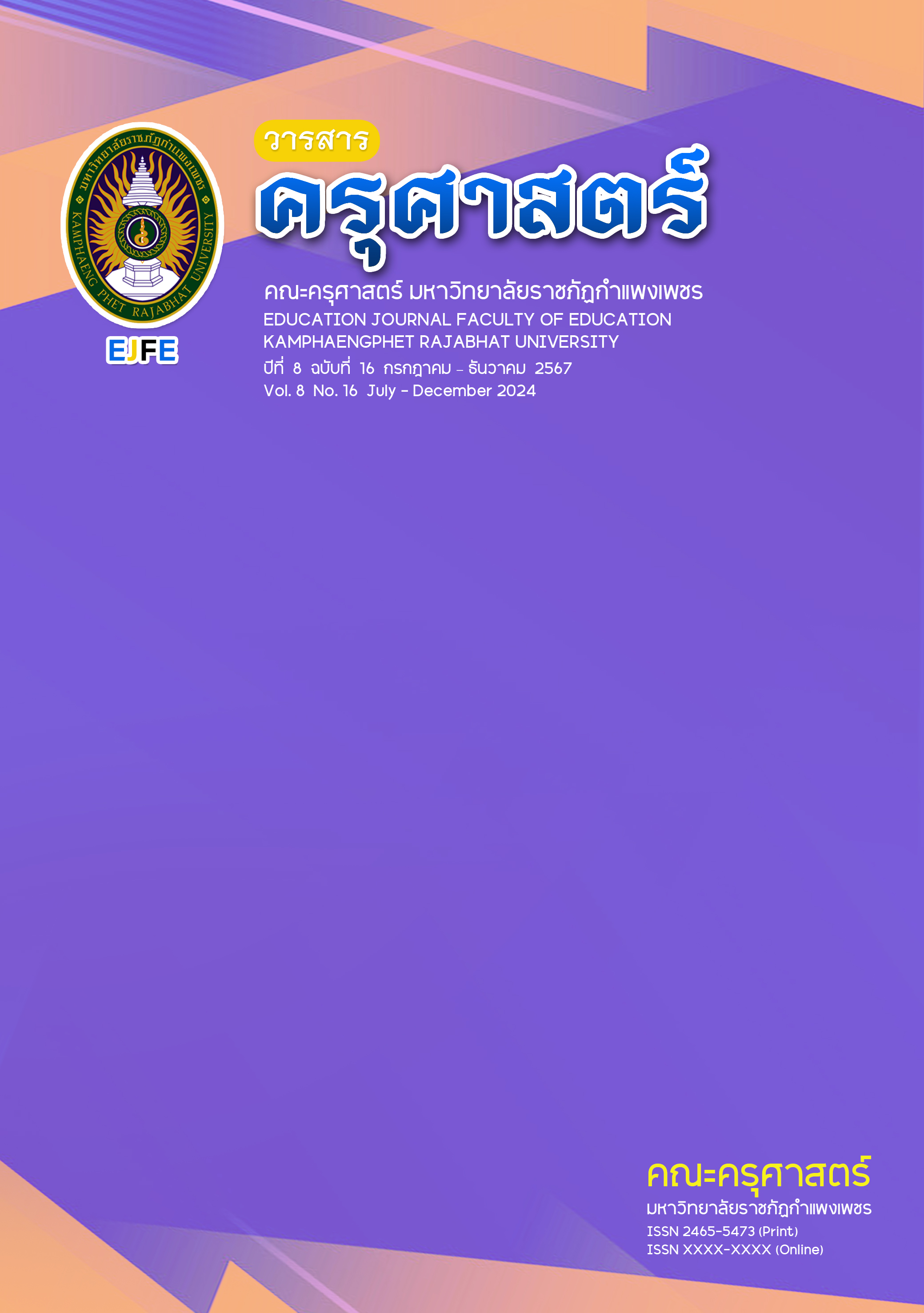CONFUCIUS' VIRTUES LEAD TO CHARACTERISTICS OF A GOOD TEACHER
Main Article Content
Abstract
This article aims to present the concept of teacher virtues based on Confucian philosophy, in order to apply them for the development of more complete teachers. Confucius was a Chinese philosopher who had a profound influence on Chinese thought, values, and culture for a long time. His teachings remain valuable and can be well adapted to teachers in the modern era. This article presents eight virtues according to Confucian ideas, which consist of Ren (benevolence), Yi (righteousness), Li (propriety), Zhi (wisdom), Xin (integrity), Yong (courage), Qian (humility), and Gong (respect). It explains the meanings and guidelines for applying these virtues in the context of being a teacher. These virtues will enable teachers to fully develop their students' potential, both in terms of knowledge and morality, through being good role models and effective teaching processes. This will lead to the cultivation of good and capable individuals to further develop society in the future. Confucian ideas remain relevant and serve as an important approach for sustainable teacher development.
Article Details

This work is licensed under a Creative Commons Attribution-NonCommercial-NoDerivatives 4.0 International License.
CC Attribution-NonCommercial-NoDerivatives 4.0
References
กระทรวงศึกษาธิการ. (2560). แผนการศึกษาแห่งชาติ พ.ศ. 2560-2579. กรุงเทพฯ: สำนักงานเลขาธิการสภาการศึกษา.
เฉลิมพล เกิดเจริญ. (2562). หลักการศึกษาในปรัชญาขงจื๊อ. กรุงเทพฯ: สำนักพิมพ์จุฬาลงกรณ์มหาวิทยาลัย.
ชวลิต ชูกำแพง. (2550). การวิจัยในชั้นเรียน. กรุงเทพฯ: ภาควิชาหลักสูตรและการสอน คณะศึกษาศาสตร์ มหาวิทยาลัยมหาสารคาม.
ทิศนา แขมมณี. (2563). ศาสตร์การสอน: องค์ความรู้เพื่อการจัดกระบวนการเรียนรู้ที่มีประสิทธิภาพ. กรุงเทพฯ: สำนักพิมพ์แห่งจุฬาลงกรณ์มหาวิทยาลัย.
ธนวรรณ เหมือนวงศ์. (2562). บุคลิกภาพของครูที่ส่งผลต่อประสิทธิภาพการสอน. กรุงเทพฯ: มหาวิทยาลัยรามคำแหง.
บุญเลี้ยง ทุมทอง. (2556). การพัฒนาหลักสูตร. กรุงเทพฯ: โรงพิมพ์แห่งจุฬาลงกรณ์มหาวิทยาลัย.
พรชัย หนูแก้ว. (2554). หลักการศึกษา. กรุงเทพฯ: โอเดียนสโตร์.
พระมหาบุญเลิศ วรธมฺโม. (2563). คุณธรรมจริยธรรมสำหรับวิชาชีพครู. กรุงเทพฯ: โรงพิมพ์มหาจุฬาลงกรณราชวิทยาลัย.
พระราชบัญญัติการศึกษาแห่งชาติ พ.ศ. 2542 และที่แก้ไขเพิ่มเติม. (2542, 19 สิงหาคม). ราชกิจจานุเบกษา. เล่มที่ 116 ตอนที่ 74 ก. หน้า 1-23.
พระอรุณ พุทฺธินนฺโท. (2546). รัฐบาลที่เลวร้ายยิ่งกว่าเสือ…สุภาษิตขงจื๊อ กับคำถามแรกของปี 2546. นิตยสารศิลปวัฒนธรรม, จาก https://www.silpa-mag.com/quotes-in-history/article_6660. สืบค้น 10 ตุลาคม 2567.
รัตนะ บัวสนธ์. (2563). คุณธรรม จริยธรรม และจรรยาบรรณวิชาชีพครู. พิษณุโลก: มหาวิทยาลัยนเรศวร.
ราชบัณฑิตยสถาน. (2556). พจนานุกรม ฉบับราชบัณฑิตยสถาน พ.ศ. 2554. กรุงเทพฯ: ราชบัณฑิตยสถาน.
วรินทิพย์ มาศชาย. (2563). การพัฒนาบุคลิกภาพความเป็นครูมืออาชีพ. นครสวรรค์: มหาวิทยาลัยราชภัฏนครสวรรค์.
วิจารณ์ พานิช. (2555). วิถีสร้างการเรียนรู้เพื่อศิษย์ในศตวรรษที่ 21. กรุงเทพฯ: มูลนิธิสดศรี-สฤษดิ์วงศ์.
สำนักงานเลขาธิการสภาการศึกษา กระทรวงศึกษาธิการ. (2560). แผนการศึกษาแห่งชาติ พ.ศ. 2560-2579. กรุงเทพฯ: พริกหวานกราฟฟิค.
อำนวย คำตื้อ. (2561). ขงจื๊อ: ปรมาจารย์แห่งแดนมังกร. กรุงเทพฯ: สำนักพิมพ์มติชน.
Ames, R. T., & Rosemont, H. (1998). The Analects of Confucius: A philosophical translation. New York, NY: Ballantine Books.
Chan, W. T. (1963). A source book in Chinese philosophy. Princeton, NJ: Princeton University Press.
Good, C. V. (1973). Dictionary of education (3rd ed.). New York: McGraw-Hill.
Huang, C. C. (1997). The Analects of Confucius. Oxford University Press.
Shim, S. H. (2008). A philosophical investigation of the role of teachers: A synthesis of Plato, Confucius, Buber, and Freire. Teaching and Teacher Education, 24(3), 515-535.
Tan, C. (2017). Teaching and learning in Confucian perspective. In Educational Theory and Contestable Values in Liberal Societies (pp. 95-113). Springer, Singapore.
Tu, W. (1998). Humanity and self-cultivation: Essays in Confucian thought. Boston, MA: Cheng & Tsui.
Yao, X. (2000). An Introduction to Confucianism. Cambridge: Cambridge University Press.


